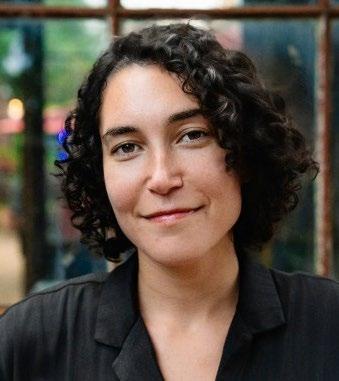Mayan Herman draws on clinical and cultural experience to guide social work students
Experience Shaped a Career
Professor Mayan Herman was born into the world of social work. Her mother, while managing her own chronic pain, was active in their community, aiding clients with chronic pain as well.
“I grew up with social work around me,” Herman said. So, when deciding on her major, Herman thought social work “just made sense.”
Herman’s academic journey began at the University of Pittsburgh, where she joined the Child Welfare Education for Baccalaureates. The CWEB program is a partnership between federal, state and accredited Pennsylvania social work programs to prepare undergraduate students for careers in the state’s public child welfare agencies.
During her time with CWEB, Herman drove extensively around Pennsylvania, witnessing food deserts, poverty, and the effects of a lack of public services. Though the cases were often disheartening, she remained dedicated to connecting with families and improving the lives of children under her care.
“I learned from the families,” Herman said. They had to teach and correct, said Herman, noting how the experience challenged her preconceived notions about parenting. After completing her master’s at the University of Michigan in 2016, she moved to Texas.
“I’m bilingual, so I wanted to work on my Spanish,” Herman said. The area in Michigan where she lived had very few Spanish-speakers, so Texas — and Austin specifically — offered both linguistic opportunities and other attractions like a great climate and live music scene. In Texas, Herman specialized in addiction treatment, a setting she quickly came to love. She ran education groups, created dialectical behavior therapy programs, and found joy in breaking down complex topics like neurobiology. Even though she valued her clinical work, the toll was real. “I burned out from clinical work, big time.”
Transition from Clinician to Educator
“I like neurobiology, and talking about how the brain works, and how addiction impacts the brain and how people get addicted,” Herman said. “So I started thinking, ‘I want to be a professor.’”
Having supervised UT interns at KIPP Austin Comunidad and Omega Recovery, she knew the incredible potential of the students coming from the UT School of Social Work.
“I loved it. UT students are smart,” Herman said. Having Mary Beer as her clinical supervisor helped as well. “She would tell me about teaching, and that fascinated me.”
Now in her first year as a full-time clinical assistant professor, Herman is using her field experience to connect with her BSW and MSW students in meaningful ways. As a clinical supervisor, she supports students as they transition from classroom to practicum, their first position with a social work agency.
Her teaching has evolved, too. “As a professor, I have grown a lot because I have taken a lot of feedback.” In her early semesters, she’d lecture the entire class period. “That’s the mistake I made when I first started teaching. I just talked and talked and talked forever.”
Today, Herman keeps sessions engaging by incorporating games and discussions about class content and the practicum experience. She plans to one day teach a course on creative writing and storytelling in social work, using it as a tool for reflection and self-care.

